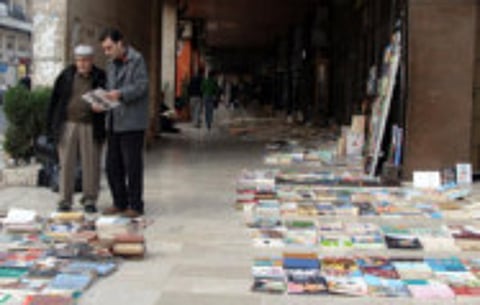Syrian bookstores struggle for survival
Five years of war has nearly decimated the industry and most Syrians can't afford to buy imported books

Beirut: Book sales and production — once a prized commodity of the Damascus intelligentsia — are now suffocating, just like everything else in Syria, due to five years of war.
Storehouses have been torched, classics have been destroyed, and so has Syria’s only paper factory.
Foreign books have disappeared from the Syrian market due to their astronomical prices when measured against the plummeting Syrian currency.
However, against all odds, some Syrian bookstores still remain open, attending to a small and cultured elite who despite huge financial difficulties, still have the decency and time to buy new books and sit down to read them.
“We haven’t changed our prices in five years” said the bookshop clerk in downtown Damascus, in reference to the time not-so-long ago when the exchange rate was 50 SP (84 fils) to US $1.
“We have no other choice to get rid of our stock,” he added, explaining that if prices are adjusted to today’s rates, his store would not sell a single book.
For example, President Jimmy Carter’s classic “Palestine: Peace Not Apartheid” is on sale for 2,000 SP.
Just five years ago, 2,000 SP were exactly US $40 (Dh147).
If he were to sell it for US $40 today that now makes SP 18,000 — half a month’s salary for most Syrians.
Among the titles on sale for such comical prices are a book about the UK Prime Minister called ‘Cameron on Cameron’ (2008), Bob Woodward’s “Bush at War” (2002), and former Egyptian First Lady Jehan Sadat’s “A Woman of Egypt” (1989).
This is the only library in Damascus — perhaps all of Syria — that still sells English books published in London or the United States.
There weren’t many to start out with, even before 2011.
Others have long given up on selling any books published outside of Syria.
The works of Palestinian poet Mahmoud Darwish and Egyptian journalist Mohammad Hasanein Heikal, for example, are now both rare commodities, since all of them were published either in Beirut or Cairo.
Simply, they are now too expensive for Syrian readers, and buying used books off the internet is prohibited by US sanctions and Syrian government regulations.
eBay cannot ship to Syria and Amazon is banned by Syrian authorities.
Instead, Syrians now prefer photocopying books or downloading pirated PDFs from the net.
Academic books are even more difficult to find — especially medical textbooks that can run up to $300 for latest editions. In Syrian paper currency, it’s more than government ministers make officially — on paper — per month.
Medical textbooks cannot be photocopied, as colour is a vital component of educational charts, diagrams, and drawings.
Even books published in Syria are not as readily available as they used to be five years ago.
Most publishers have storehouses in the Damascus countryside. Many of them have been destroyed by the ongoing war in Al-Ghouta, the agricultural belt surrounding the Syrian capital.
Others are trapped in the crossfire and nobody dares to venture and rescue the thousands of books held under siege of the Syria war.
The only Syrian paper factory of Deir Al Zor along the Euphrates River has been completely demolished by the war, forcing the Ministry of Culture to recycle all of its books published before the year 2000.
It is destroying old books in order to print new ones — selling at subsidised prices to make them affordable to Syrian readers.
The annual Damascus International Fair — a high profile educational and commercial event — has now been suspended for the fifth year in a row, due to security reasons.
At this annual event, hosted by the Ministry of Culture since the 1980s, publishers from around the world used to sell their books at reduced prices to Syrian readers.
The best-selling items before 2011 were horoscope books, cookbooks, religion books, Nizar Qabbani poetry, and the Quran.
Books in regular demand such as the novels of Brazilian author Paolo Coelho, Lebanese writer Amin Maalouf, and Algerian novelist Ahlam Masteghanmi are being reprinted by Syrian publishers, sometimes in low quality and in infringement of copyright laws, to remain on the Syrian market and maintain the city’s already mediocre reading culture, despite five years of war.
Publishing 1000-copies of a 300-page black & white book and distributing it through a reputed Syrian publishing house now costs no more than 150,000 SP ($333 USD). In neighbouring Lebanon, the same costs $1,500-2,500.
Sign up for the Daily Briefing
Get the latest news and updates straight to your inbox


